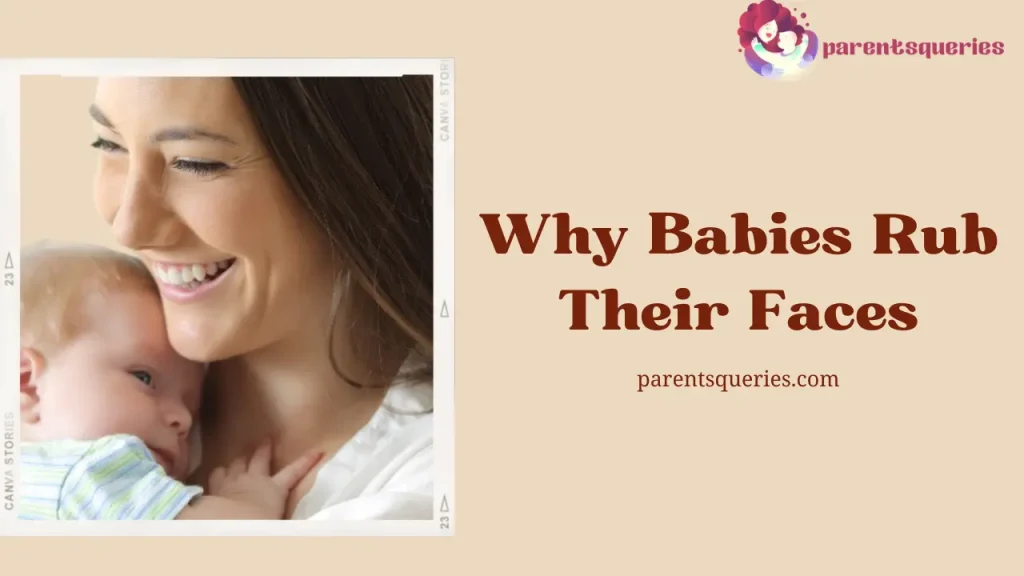Babies are full of surprises, and one of their most intriguing habits is the act of rubbing their tiny faces. This natural tendency leaves many parents bewildered and curious about its underlying reasons. In this article, we will delve into the world of babies and why Babies Rub Their Faces, exploring its origins, potential significance, and how parents should respond. Check out what color is poop before labor.
Why Do Babies Rub Their Faces?
Sensory Exploration and Tactile Stimulation
Babies are sensory beings from birth, and their delicate faces provide a wealth of sensations. Rubbing their cheeks, nose, or eyes allows them to explore the world around them through touch. It’s their way of getting to know themselves and their environment.
Soothing and Self-Comfort
Face-rubbing often serves as a self-soothing mechanism for babies. The gentle pressure against their faces can be comforting, especially during moments of distress or fatigue. It’s like a built-in stress-relief technique.
Interaction with the Surrounding Environment
As babies grow and develop, they become more aware of their surroundings. Face-rubbing can also be a means of interaction, helping them engage with textures and sensations in the environment.
When Do Babies Start Rubbing Their Faces?
Face-rubbing behavior can start as early as in the newborn stage. It’s one of those charming quirks that emerge as babies explore their bodies and the world. As they develop, the frequency and purpose of face-rubbing may change, reaching various milestones.
Is Face-Rubbing Harmful for Babies?
Concerns may arise about whether face-rubbing poses any risks. While it’s generally harmless, parents should ensure that the baby’s hands are clean to prevent any potential skin irritation or infection. Creating a clean and safe environment is crucial.
How to Respond as Parents
To respond effectively to face-rubbing, parents can consider strategies to ensure their baby’s comfort. This includes creating a conducive sleep environment, maintaining cleanliness, and seeking medical advice when necessary.
Face-Rubbing and Sleep
Many parents wonder if face-rubbing is connected to sleep. It can be, as babies often use this behavior as a part of their self-soothing routine. Understanding this connection can help parents promote better sleep for their little ones.
Face-Rubbing and Teething
The discomfort of teething can lead babies to rub their faces more often. We will explore this connection and provide tips on managing teething discomfort and remedies to ease the process.
Is Face-Rubbing a Sign of Allergies or Skin Conditions?
Sometimes, face-rubbing can indicate skin-related issues. It’s essential for parents to recognize potential signs and consult a pediatrician if they suspect allergies or skin conditions.
How to Observe and Document Face-Rubbing
Keeping track of your baby’s face-rubbing behavior can be helpful. We’ll discuss useful tools and methods for observing and documenting this intriguing habit.
Face-Rubbing and Emotional Expression
Understanding the emotional aspect of face-rubbing is crucial. Babies use this behavior to express discomfort, curiosity, or joy. It’s a non-verbal way they communicate with the world.
Face-Rubbing and Cognitive Development
Believe it or not, face-rubbing can contribute to cognitive development. We’ll explore how this sensory exploration enhances brain development in infants.
Face-Rubbing in Different Cultures
Cultural perspectives on baby behavior vary worldwide. We’ll take a look at traditions and beliefs related to face-rubbing in different cultures, shedding light on this fascinating phenomenon.
Common Misconceptions About Face-Rubbing
Like many aspects of parenting, myths and misconceptions abound. We will debunk some of these misconceptions and highlight the facts about face-rubbing.
Expert Opinions and Research
For a deeper understanding of this behavior, we’ll turn to the experts. Pediatricians and child psychologists offer valuable insights, and we’ll explore recent studies on infant behavior to shed more light on this topic.
Conclusion
In the end, babies are unique, and their face-rubbing behavior is a part of their individuality. As parents, it’s important to embrace this uniqueness, providing a safe and supportive environment where your baby can explore and grow.
Don’t forget to celebrate the little quirks that make your baby special. After all, each baby is one-of-a-kind.
FAQs
1. Is face-rubbing normal for babies?
Yes, it’s a common behavior that many babies exhibit as part of their sensory exploration.
2. Can face-rubbing lead to skin issues?
While face-rubbing is generally harmless, parents should ensure their baby’s hands are clean to prevent any potential skin irritation or infection.
3. When do babies typically start rubbing their faces?
Face-rubbing behavior can start as early as in the newborn stage and may continue as they grow.
4. How can I help my baby sleep better if they’re rubbing their face?
Creating a comfortable sleep environment and understanding the connection between face-rubbing and sleep can be helpful in promoting better sleep.
5. Is face-rubbing related to teething?
Teething discomfort can lead to increased face-rubbing in babies. We’ll provide tips and remedies to manage this discomfort effectively.
Read our more blogs here, like The Benefits of Following a Diet Food Plan in Dubai
You may also like
-
The Complete Guide to the Oxva Nexlim Pod Kit
-
Enhancing Crop Yield: The Role of Drone Spraying in Auburn’s Agriculture
-
From Drab to Fab: Inspiring Before and After Kitchen Cabinet Transformation Stories
-
Dance and Delight: Finding the Perfect Israeli Wedding DJ for NYC Receptions
-
The Big Decision: Sony vs Samsung TV Buying Guide

